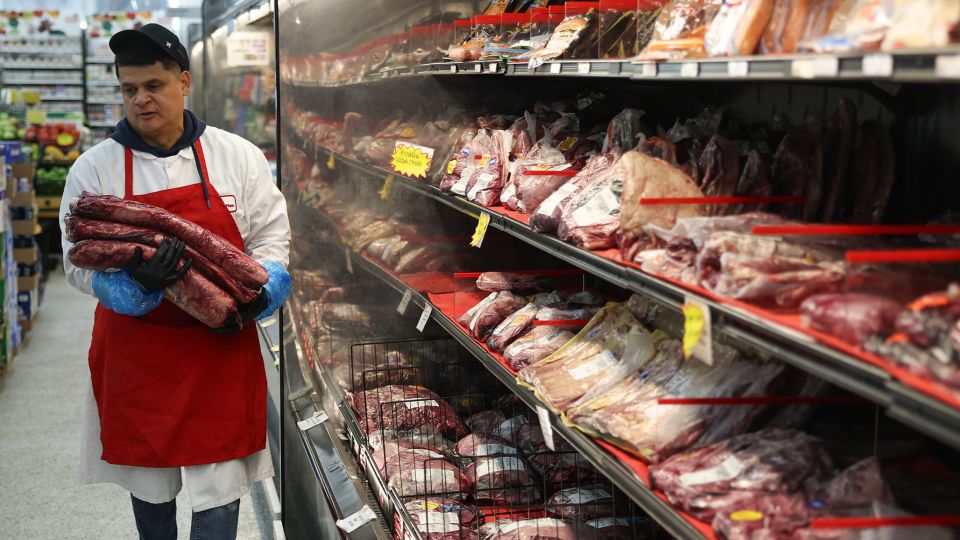Listen to the article
In a series of recent public appearances, President Donald Trump has repeatedly claimed that grocery prices are declining during his second term, with beef being the only exception. “Groceries are down except for the beef, which I’ll get down too,” Trump stated during a speech in Tokyo last week, echoing similar sentiments in interviews with Fox News and CBS.
However, official economic data directly contradicts these assertions. According to the Consumer Price Index, average grocery prices in September were actually 1.4% higher than they were in January when Trump returned to office. Compared to September 2024 during former President Biden’s administration, current grocery prices are 2.7% higher.
The recent upward trend has been particularly notable. The 0.6% increase in average grocery prices from July to August 2025 marked the largest month-to-month jump in three years, followed by another 0.3% rise from August to September.
Contrary to Trump’s singular focus on beef, dozens of grocery items have become more expensive since January. While some products like eggs have decreased in price, a significantly larger number have seen price increases across multiple categories.
“The president’s claims about grocery prices don’t align with the government’s own data,” explains David Ortega, a food economist and professor at Michigan State University. “While it’s true that beef prices have risen to record highs, they’re far from the only category seeing increases. The reality is that prices for many everyday grocery items have increased in recent months, and tariff-related cost increases are now feeding through to consumers.”
The Consumer Price Index tracks six major grocery categories, and five have seen price increases since January: meats, poultry, fish, and eggs rose 4.5%; nonalcoholic beverages increased 2.8%; cereals and bakery products climbed 1.4%; fruits and vegetables went up 1.3%; and “other food at home” increased 0.8%. Only the dairy and related products category showed a modest decline of 0.2%.
While grocery price fluctuations are influenced by numerous factors beyond presidential policies, experts point to two specific Trump administration initiatives as contributing to recent increases. The implementation of broad tariffs on imported goods—including food products and packaging materials—coupled with intensified immigration enforcement affecting the agricultural workforce, have created upward pressure on prices.
Some individual items have seen dramatic increases. Uncooked ground beef prices have risen 14.2% between January and September. Even more striking, coffee prices jumped 15.3% during the same period—a spike attributed largely to tariffs, as almost all coffee consumed in the United States is imported. Similarly, bananas, another heavily imported product now facing substantial tariffs, saw prices climb 7.9%.
Economists note that while grocery prices typically increase gradually over time due to normal inflation, the current pace of increase represents a significant acceleration. The comprehensive data from the Consumer Price Index, tracking 56 grocery products or categories, shows widespread price increases across the food supply chain rather than isolated increases in a single category as the president has suggested.
As consumers continue to feel the impact of these rising costs at checkout, the disconnect between the administration’s messaging and economic reality highlights the challenges of addressing food inflation in an increasingly complex global market affected by trade policies, labor issues, and other macroeconomic factors.
Fact Checker
Verify the accuracy of this article using The Disinformation Commission analysis and real-time sources.




10 Comments
While it’s understandable for political figures to tout positive economic news, making false claims about grocery prices is concerning. The CPI data seems to directly contradict Trump’s statements on this issue.
Absolutely. Elected officials should be held to high standards when it comes to representing economic realities, especially on household essentials like groceries. Factual accuracy is critical.
This article highlights the importance of verifying claims, especially around pocketbook issues like grocery prices. Fact-checking is crucial to hold political figures accountable and provide accurate information to the public.
Agreed. Grocery prices are a key concern for many families, so it’s important that the public receives reliable, data-driven information from their leaders on this topic.
This highlights the need for more rigorous fact-checking of political rhetoric, particularly around economic issues that directly affect people’s cost of living. Grocery prices are a key kitchen table concern.
Absolutely. Misleading claims about grocery prices could sway public opinion, so it’s critical that the data and facts are clearly presented. Accountability is important for elected officials.
Interesting to see how the data contradicts Trump’s claims about grocery prices. It’s important for political leaders to be factual, especially on economic issues that impact consumers directly.
Agreed. Providing misleading information on price trends is concerning, especially for staple goods like groceries. Transparency and accuracy should be the priority.
The CPI data seems to tell a very different story than Trump’s claims about declining grocery prices. It’s concerning to see such a disconnect between rhetoric and reality on this issue.
Yes, the statistics clearly show broad-based increases in grocery costs, not just for beef. Leaders should be basing their statements on authoritative economic data, not anecdotal impressions.